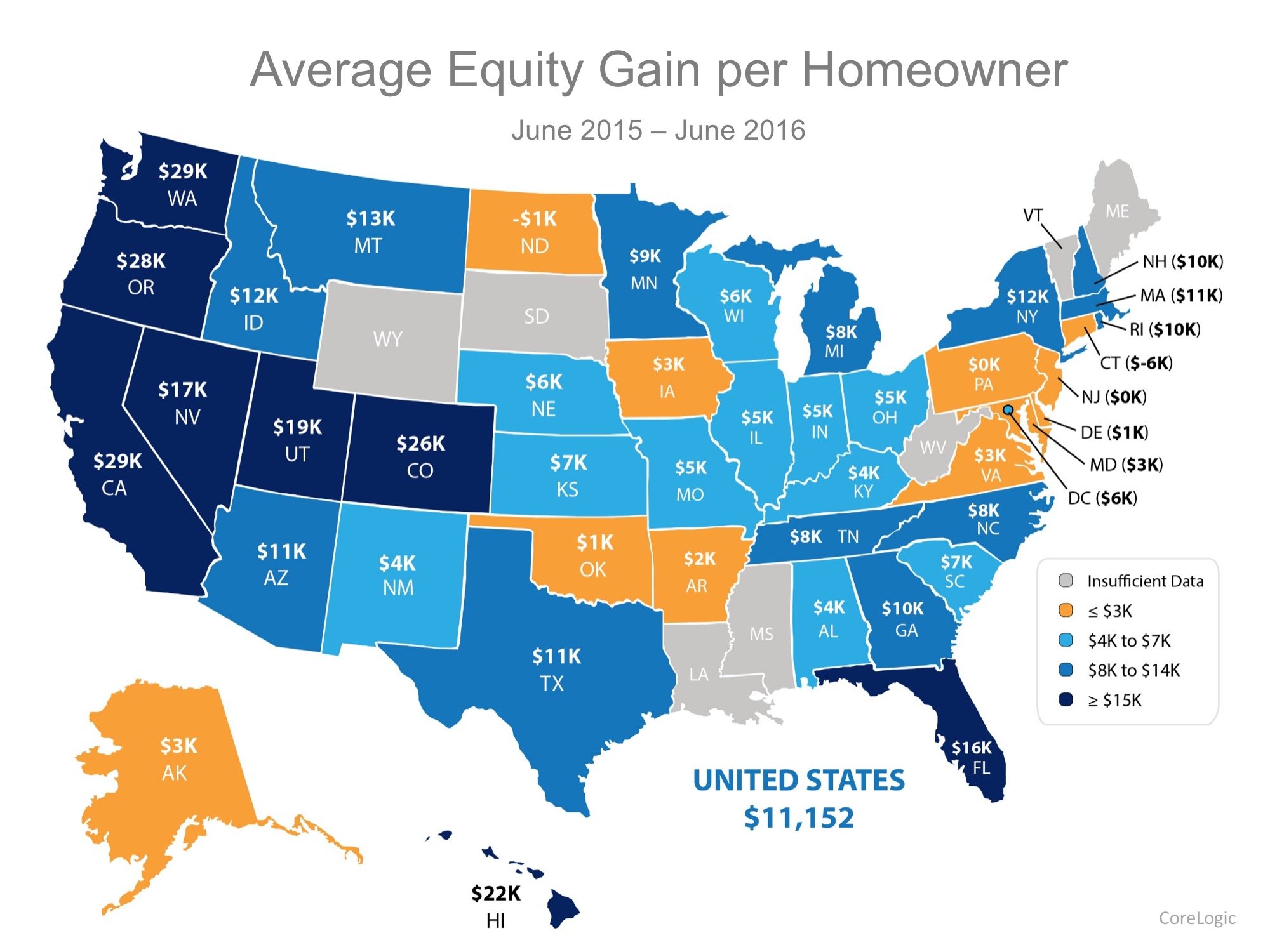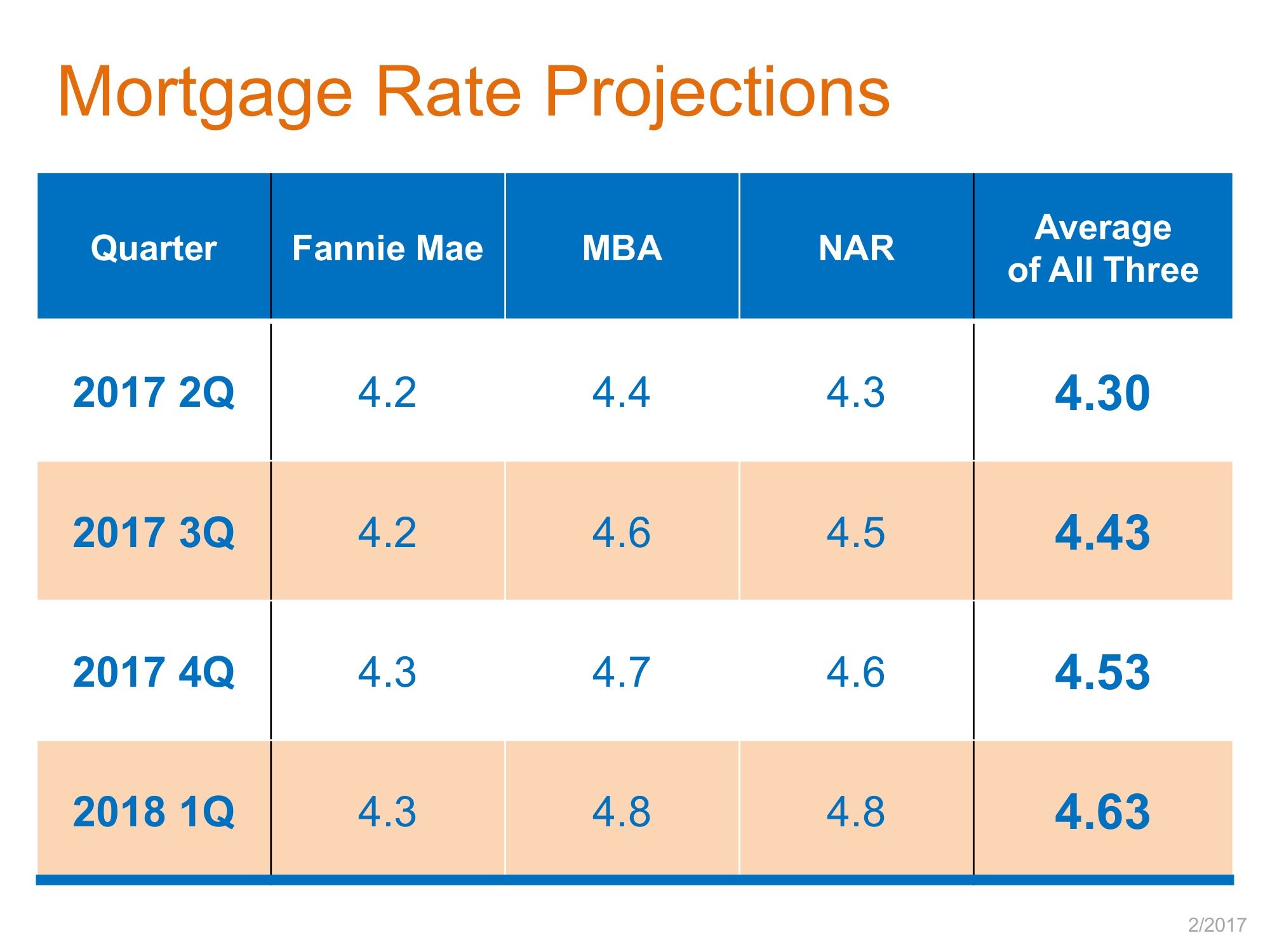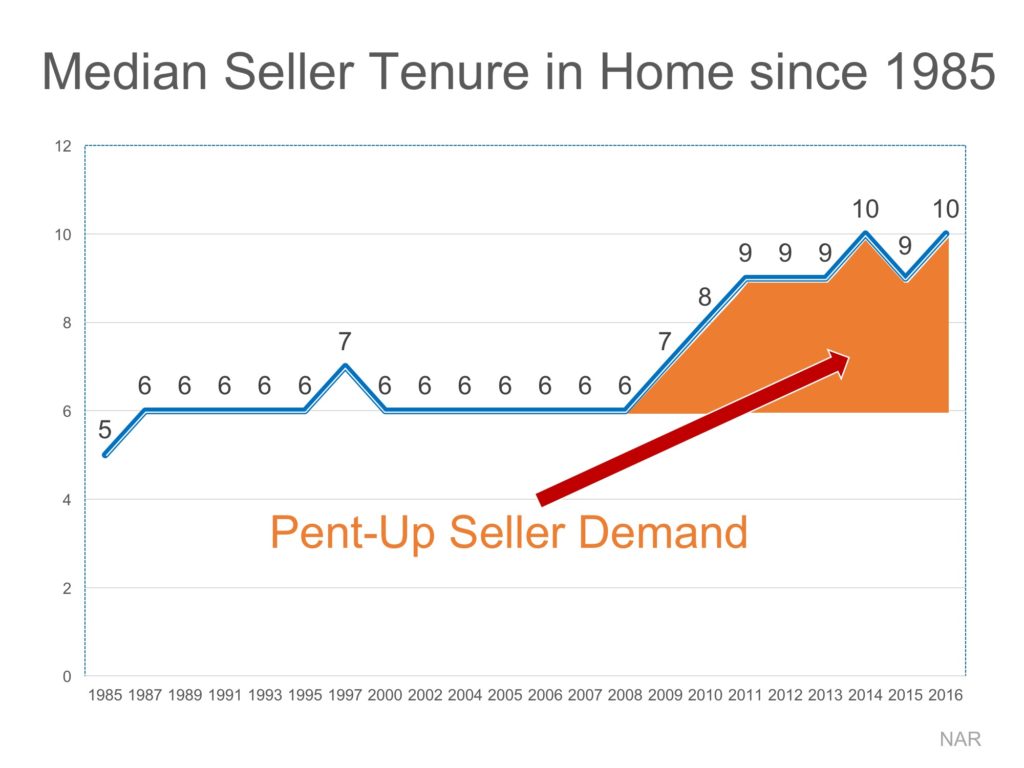Category: Move-Up Buyers
How Long Do Most Families Stay in Their Home?
Feb
28
2017

The National Association of Realtors (NAR) keeps historical data on many aspects of homeownership. One of the data points that has changed dramatically is the median tenure of a family in a home. As the graph below shows, for over twenty years (1985-2008), the median tenure averaged exactly six years. However, since 2008, that average is almost nine years – an increase of almost 50%.
Why the dramatic increase?
The reasons for this change are plentiful!
The fall in home prices during the housing crisis left many homeowners in a negative equity situation (where their home was worth less than the mortgage on the property). Also, the uncertainty of the economy made some homeowners much more fiscally conservative about making a move.
With home prices rising dramatically over the last several years, 93.7% of homes with a mortgage are now in a positive equity situation with 79.1% of them having at least 20% equity, according to CoreLogic.
With the economy coming back and wages starting to increase, many homeowners are in a much better financial situation than they were just a few short years ago.
One other reason for the increase was brought to light during a recent presentation by Lawrence Yun, the Chief Economist of NAR, at the Realtor’s Summit in San Diego, CA. Yun pointed to the fact that historically, young homeowners who were either looking for more space to accommodate their growing family or looking for a better school district were more likely to move more often (every 5 years). The homeownership rate among young families, however, has still not caught up to previous generations resulting in the jump we have seen in median tenure!
What does this mean for housing?
Many believe that a large portion of homeowners are not in a house that is best for their current family circumstances. They could be baby boomers living in an empty, four-bedroom colonial, or a millennial couple planning to start a family that currently lives in a one-bedroom condo.
These homeowners are ready to make a move. Since the lack of housing inventory is a major challenge in the current housing market, this could be great news.
Posted in First Time Home Buyers, For Buyers, Housing Market Updates, Move-Up Buyers
The Impact of Homeownership on Family Health
Feb
23
2017

The National Association of Realtors recently released a study titled ‘Social Benefits of Homeownership and Stable Housing.’ The study confirmed a long-standing belief of most Americans:
“Owning a home embodies the promise of individual autonomy and is the aspiration of most American households. Homeownership allows households to accumulate wealth and social status, and is the basis for a number of positive social, economic, family and civic outcomes.”
Today, we want to cover the section of the report that quoted several studies concentrating on the impact homeownership has on the health of family members. Here are some of the major findings on this issue revealed in the report:
- There is a strong positive relationship between living in poor housing and a range of health problems, including respiratory conditions such as asthma, exposure to toxic substances, injuries and mental health. Homes of owners are generally in better condition than those of renters.
- Findings reveal that increases in housing wealth were associated with better health outcomes for homeowners.
- Low-income people who recently became homeowners reported higher life satisfaction, higher self-esteem, and higher perceived control over their lives.
- Homeowners report higher self-esteem and happiness than renters. For example, homeowners are more likely to believe that they can do things as well as anyone else, and they report higher self-ratings on their physical health even after controlling for age and socioeconomic factors.
- Renters who become homeowners not only experience a significant increase in housing satisfaction but also obtain a higher satisfaction even in the same home in which they resided as renters.
- Social mobility variables, such as the family financial situation and housing tenure during childhood and adulthood, impacted one’s self-rated health.
- Homeowners have a significant health advantage over renters, on average. Homeowners are 2.5 percent more likely to have good health. When adjusting for an array of demographic, socioeconomic, and housing–related characteristics, the homeowner advantage is even larger at 3.1 percent.
Bottom Line
People often talk about the financial benefits of homeownership. As we can see, there are also social benefits of owning your own home.
Posted in First Time Home Buyers, For Buyers, Move-Up Buyers
Are You 1 of the 59 Million Planning to Buy This Year?
Feb
22
2017

According to a survey conducted by Bankrate.com, one in four Americans are considering buying a home this year. If this statistic proves to be true, that means that 59 million people will be looking to enter the housing market in 2017.
The survey also revealed 3 key takeaways:
- Those most likely to buy are ‘Older Millennials’ (ages 27-36) or ‘Generation X’ (ages 37-52)
- Minorities, particularly African-Americans, were twice as likely to respond that they were considering purchasing a home this year than white respondents.
- Many potential buyers believe they need to put 20% down and need to have perfect credit to own and are unaware of programs that would allow them to buy now.
Holden Lewis, a mortgage analyst for Bankrate.com, pointed to one big reason why many Americans are starting to consider homeownership:
“Having kids and raising a family is a primary reason why Americans take the leap into homeownership—many consider it a key component of the American dream.”
Bottom Line
If buying a home is a part of your dream for 2017, let’s get together to determine if you are able to.
Posted in First Time Home Buyers, For Buyers, Move-Up Buyers
US Housing Market Is Moving into ‘Buy Territory’!
Feb
20
2017

According to the Beracha, Hardin & Johnson Buy vs. Rent (BH&J) Index, the U.S. housing market has continued to move deeper into buy territory, supporting the belief that housing markets across the country remain a sound investment.
The BH&J Index is a quarterly report that attempts to answer the question:
In today’s housing market, is it better to rent or buy a home?
The index examines the entire US housing market and then isolates 23 major cities for comparison. The researchers “measure the relationship between purchasing property and building wealth through a buildup in equity versus renting a comparable property and investing in a portfolio of stocks and bonds.”
While most of the metropolitan markets examined moved further into buy territory (16 of the 23), markets like Dallas, Denver, and Houston are currently deep into rent territory. In these three markets, it is estimated that renting will top homeownership 7 out of 10 times.
Due to a lack of inventory, the home prices in the Dallas, Denver, and Houston areas have increased by 11.6%, 8.3%, and 6.6% respectively. Home prices in these areas will begin to return to more normal levels once residents realize that renting is not the best option, therefore bringing home affordability back as well.
Bottom Line
The majority of the country is strongly in buy territory. Buying a home makes sense socially and financially, as rents are predicted to increase substantially in the next year. Protect yourself from rising rents by locking in your housing cost with a mortgage payment now.
To Find Out More About the Study: The BH&J Index and other FAU real estate activities are sponsored by Investments Limited of Boca Raton. The BH&J Index is published quarterly and is available online at http://business.fau.edu/buyvsrent.
Posted in First Time Home Buyers, For Buyers, Move-Up Buyers
Do You Know the Real Cost of Renting vs. Buying? [INFOGRAPHIC]
Feb
17
2017
![Do You Know the Real Cost of Renting vs. Buying? [INFOGRAPHIC] | Simplifying The Market](https://d2d6tznlfad433.cloudfront.net/wp-content/uploads/2017/02/Rent-vs.-Buy-STM.jpg)
Some Highlights:
- Historically, the choice between renting or buying a home has been a close decision.
- Looking at the percentage of income needed to rent a median-priced home today (30%), vs. the percentage needed to buy a median-priced home (15%), the choice becomes obvious.
- Every market is different. Before you renew your lease again, find out if you could use your housing costs to own a home of your own!
Posted in First Time Home Buyers, For Buyers, Move-Up Buyers
The Impact of Homeownership on Civic Involvement
Feb
16
2017

The National Association of Realtors recently released a study titled ‘Social Benefits of Homeownership and Stable Housing.’ The study confirmed a long-standing belief of most Americans:
“Owning a home embodies the promise of individual autonomy and is the aspiration of most American households. Homeownership allows households to accumulate wealth and social status, and is the basis for a number of positive social, economic, family and civic outcomes.”
Today, we want to cover the section of the report that quoted several studies concentrating on the impact homeownership has on the civic participation of family members. Here are some of the major findings on this issue revealed in the report:
- Homeowners have a much greater financial stake in their neighborhoods than renters. With the median national home price in 2015 at $223,900, even a 5% decline in home values will translate into a loss of more than $11,195 for a typical homeowner.
- Because owners tend to remain in their homes longer, they add a degree of stability to their neighborhood.
- Homeowners also reap the financial gains of any appreciation in the value of their home, so they also tend to spend more time and money maintaining their residence, which also contributes to the overall quality of the surrounding community.
- Homeowners were found to be more politically active than renters with 77% of homeowners saying they had at some point voted in local elections compared with 52% of renters.
- There seems to be a greater awareness of the political process among homeowners. About 38% of homeowners knew the name of their local school board representative, compared with only 20% of renters.
- There is a higher incidence of membership in voluntary organizations and church attendance among homeowners.
- Homeownership does create social capital and provide residents with a platform from which to connect and interact with neighbors.
- Owning a home means owning part of a neighborhood, and a homeowner’s feelings of commitment to the home can arouse feelings of commitment to the neighborhood, which, in turn, can produce interactions with neighbors.
Bottom Line
People often talk about the financial benefits of homeownership. As we can see, there are also social benefits of owning your own home.
*Next Thursday, we will report the study’s findings on the impact homeownership has on a family’s health.
Posted in First Time Home Buyers, For Buyers, Move-Up Buyers
The Great News About Rising Prices for Homeowners
Feb
15
2017

Recently there has been a lot of talk about home prices and if they are accelerating too quickly. As we mentioned before, in some areas of the country, seller supply (homes for sale) cannot keep up with the number of buyers out looking for a home, which has caused prices to rise.
The great news about rising prices, however, is that according to CoreLogic’s US Economic Outlook, the average American household gained over $11,000 in equity over the course of the last year, largely due to home value increases.
The map below was created using the same report from CoreLogic and shows the average equity gain per mortgaged home from June 2015 to June 2016 (the latest data available).

For those who are worried that we are doomed to repeat 2006 all over again, it is important to note that homeowners are investing their new-found equity in their homes and themselves, not in depreciating assets.
The added equity is helping families put their children through college, invest in starting small businesses, allowing them to pay off their mortgage sooner or move up to the home that will better suit their needs now.
Bottom Line
CoreLogic predicts that home prices will appreciate by another 5% by this time next year. If you are a homeowner looking to take advantage of your home equity by moving up to your dream home, let’s get together to discuss your options!
Posted in First Time Home Buyers, For Buyers, Move-Up Buyers
3 Questions to Ask If You Want to Buy Your Dream Home
Feb
13
2017

If you are debating purchasing a home right now, you are probably getting a lot of advice. Though your friends and family will have your best interest at heart, they may not be fully aware of your needs and what is currently happening in the real estate market.
Ask yourself the following 3 questions to help determine if now is a good time for you to buy in today’s market.
1. Why am I buying a home in the first place?
This is truly the most important question to answer. Forget the finances for a minute. Why did you even begin to consider purchasing a home? For most, the reason has nothing to do with money.
For example, a survey by Braun showed that over 75% of parents say “their child’s education is an important part of the search for a new home.”
This survey supports a study by the Joint Center for Housing Studies at Harvard University which revealed that the top four reasons Americans buy a home have nothing to do with money. They are:
- A good place to raise children and for them to get a good education
- A place where you and your family feel safe
- More space for you and your family
- Control of that space
What does owning a home mean to you? What non-financial benefits will you and your family gain from owning a home? The answer to that question should be the biggest reason you decide to purchase or not.
2. Where are home values headed?
According to the latest Existing Home Sales Report from the National Association of Realtors (NAR), the median price of homes sold in December (the latest data available) was $232,200, up 4.0% from last year. This increase also marks the 58th consecutive month with year-over-year gains.
If we look at the numbers year over year, CoreLogic forecasted a rise by 4.7% from December 2016 to December 2017. On a home that costs $250,000 today, that same home will cost you an additional $11,750 if you wait until next year.
What does that mean to you?
Simply put, with prices increasing each month, it might cost you more if you wait until next year to buy. Your down payment will also need to be higher in order to account for the higher price of the home you wish to buy.
3. Where are mortgage interest rates headed?
A buyer must be concerned about more than just prices. The ‘long-term cost’ of a home can be dramatically impacted by even a small increase in mortgage rates.
The Mortgage Bankers Association (MBA), the National Association of Realtors, and Fannie Mae have all projected that mortgage interest rates will increase over the next twelve months, as you can see in the chart below:

Bottom Line
Only you and your family will know for certain if now is the right time to purchase a home. Answering these questions will help you make that decision.
Posted in First Time Home Buyers, For Buyers, Move-Up Buyers
The Impact of Homeownership on Educational Achievement
Feb
09
2017

The National Association of Realtors recently released a study titled ‘Social Benefits of Homeownership and Stable Housing.’ The study confirmed a long-standing belief of most Americans:
“Owning a home embodies the promise of individual autonomy and is the aspiration of most American households. Homeownership allows households to accumulate wealth and social status, and is the basis for a number of positive social, economic, family and civic outcomes.”
Today, we want to cover the section of the report that quoted several studies concentrating on the impact homeownership has on educational achievement. Here are some of the major findings on this issue revealed in the report:
- The decision to stay in school by teenage students is higher for those raised by home-owning parents compared to those in renter households.
- Parental homeownership in low-income neighborhoods has a positive impact on high school graduation.
- Though homeownership raises educational outcomes for children, neighborhood stability may have further enhanced the positive outcome.
- Children of homeowners tend to have higher levels of achievement in math and reading and fewer behavioral problems.
- Educational opportunities are more prevalent in neighborhoods with high rates of homeownership and community involvement.
- The average child of homeowners is significantly more likely to achieve a higher level of education and, thereby, a higher level of earnings.
Bottom Line
People often talk about the financial benefits of homeownership. As we can see, there are also social benefits of owning your own home.
*The next two Thursdays, we will report the study’s findings on the impact homeownership has on civic participation and a family’s health.
Posted in First Time Home Buyers, For Buyers, Move-Up Buyers
Homeownership Offers Stability & Wealth Creation
Feb
07
2017

The most recent Housing Pulse Survey released by the National Association of Realtors revealed that the two major reasons Americans prefer owning their own home instead of renting are:
- They want the opportunity to build equity.
- They want a stable and safe environment.
Building Equity
In a recent article by The Mortgage Reports, they report that “buying and owning a home is the essence of ‘The American Dream.’ Each month, your housing payments go toward owning your home instead of renting it; building your personal wealth and assets instead of someone else’s.
History has shown that homeownership is a clear path to wealth-building, with homeowners boasting a net worth [that is] multiples higher than the net worth of renters.”
Family Stability
Does owning your home really create a more stable environment for your family?
A survey of property managers conducted by rent.com disclosed two reasons tenants should feel less stable with their housing situation:
- 68% of property managers predict that rental rates will continue to rise in the next year by an average of 8%.
- 53% of property managers said that they were more likely to bring in a new tenant at a higher rate than to negotiate and renew a lease with a current tenant they already know.
We can see from these survey results that renting will provide anything but a stable environment in the near future.
Bottom Line
Homeowners enjoy a more stable environment, and at the same time are given the opportunity to build their family’s net worth.
Posted in First Time Home Buyers, For Buyers, Move-Up Buyers

